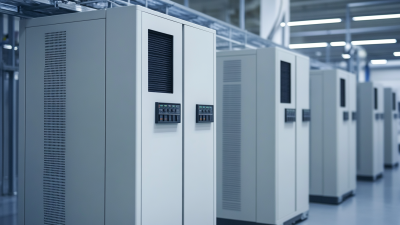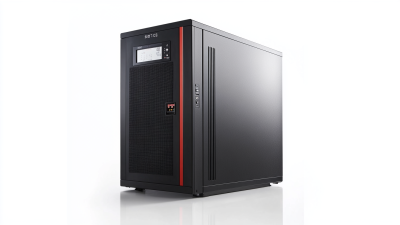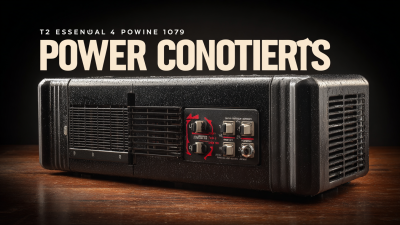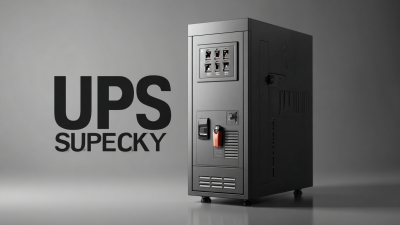Blog
How to Choose the Right Back Up Power Supply for Your Business Needs
In an increasingly digital age, the reliance on constant, uninterrupted power is more critical than ever for businesses. According to a report by the National Renewable Energy Laboratory, power outages can cost U.S. businesses an estimated $150 billion annually, highlighting the necessity of a reliable Back Up Power Supply (BUPS). With technology becoming an integral part of operations, a well-chosen BUPS not only safeguards data and equipment but also ensures operational continuity during unforeseen disruptions. However, selecting the right Back Up Power Supply involves understanding your specific business needs, including load capacity, runtime requirements, and scalability. This ultimate guide will navigate you through the essential criteria and considerations to make an informed decision, thereby empowering your business to maintain productivity and efficiency in the face of power challenges.

Understanding Different Types of Backup Power Supplies for Businesses
When it comes to ensuring business continuity during unexpected power outages, understanding the different types of backup power supplies is crucial. The most common options include
Uninterruptible Power Supplies (UPS),
generators, and power inverters.
 UPS systems provide immediate power during outages, making them ideal for sensitive equipment that requires uninterrupted operation, such as servers and networking devices. They offer a seamless transition from grid power to battery power, ensuring that your systems remain operational without disruption.
UPS systems provide immediate power during outages, making them ideal for sensitive equipment that requires uninterrupted operation, such as servers and networking devices. They offer a seamless transition from grid power to battery power, ensuring that your systems remain operational without disruption.
On the other hand, generators serve as an excellent energy source for extended power outages. They can provide electricity to an entire facility and are essential for larger operations that require sustained energy. Generators come in various fuel types, including diesel, natural gas, and propane, allowing businesses to choose the most suitable option based on local availability and budget constraints. Lastly, power inverters convert DC power from batteries into AC power, making them a cost-effective solution for small businesses looking to power essential devices during short outages. By evaluating these backup power supply options, businesses can strategically decide what best fits their operational needs and budget.
Assessing Your Business Power Requirements and Load Capacity
When selecting the right backup power supply for your business, the first crucial step is to assess your power requirements. This involves taking an inventory of all the equipment and systems that will rely on backup power during an outage. Consider not only the wattage of each device but also their importance to your operations. Prioritize essential systems, such as servers and communications equipment, to ensure they have adequate support during power disruptions. By calculating the total wattage needed, you'll have a clearer picture of the power capacity your backup system must provide.
Next, it's vital to evaluate your load capacity, which is the maximum amount of power your backup supply can handle. This involves understanding the peak power requirements your business may encounter at any given time. It's advisable to overestimate your load capacity slightly to accommodate unexpected power surges or additional equipment that may be added in the future. Investing in a backup power supply that not only meets your current needs but also allows for future growth is essential for long-term stability and security in your business operations.
Backup Power Supply Load Capacity Assessment
Key Features to Look for in a Reliable Backup Power Solution
When selecting a backup power supply for your business, it's crucial to focus on key features that ensure reliability and efficiency.
First and foremost, consider the capacity and output type of the generator. Businesses have varying energy needs, and whether you require AC or DC power will significantly impact your choice. A robust backup solution should be capable of handling your peak load demands, ensuring that operations run smoothly during outages.
Another essential feature to look for is the generator's fuel efficiency and maintenance requirements. As the market for diesel generators is projected to grow significantly, reaching a value of $25.9 billion by 2032, businesses must prioritize systems that not only provide instant power but also offer long-term sustainability. Additionally, evaluate other factors such as ease of integration with existing infrastructure, warranty provisions, and availability of customer support.
Investing in a high-quality backup power supply can protect your business from unforeseen disruptions while contributing to overall operational resilience.
Evaluating Cost vs. Benefits of Various Backup Power Systems
When evaluating backup power systems for your business, one of the most critical considerations is the cost versus benefits of various options available. A thorough analysis begins with understanding the specific power requirements of your operations. For instance, businesses with high energy demands might find that investing in a robust uninterruptible power supply (UPS) or a generator makes sense, despite the higher initial costs. These systems provide reliable power during outages, thus protecting sensitive equipment and ensuring continuity of operations, which in turn can prevent potential revenue loss.
On the other hand, smaller businesses with limited power needs may benefit from more cost-effective options like smaller UPS systems or battery backups. These alternatives often have lower initial costs and can adequately serve during shorter outages without the need for extensive infrastructure. However, it is crucial to weigh these savings against the potential risks of losing productivity or data during an unplanned power failure. A detailed cost-benefit analysis will help in identifying the right backup power supply that aligns not only with your budget but also with your long-term operational strategy.
How to Choose the Right Back Up Power Supply for Your Business Needs - Evaluating Cost vs. Benefits of Various Backup Power Systems
| Backup Power System Type | Initial Cost | Annual Maintenance Cost | Power Output (kW) | Run Time (hours) | Benefits |
|---|---|---|---|---|---|
| Uninterruptible Power Supply (UPS) | $1,500 | $300 | 10 kW | 1 | Provides instant backup, protects against surges |
| Generator | $5,000 | $500 | 50 kW | 8 | High capacity, longer run time, good for prolonged outages |
| Solar Power System | $10,000 | $200 | 5 kW | Unlimited (when sunny) | Eco-friendly, low operating cost after installation |
| Battery Backup | $2,000 | $150 | 3 kW | 2 | Reliable for short outages, easy to install |
Maintenance and Support: Ensuring Longevity of Your Power Supply
 When it comes to ensuring the longevity of your backup power supply, regular maintenance and support are paramount. A reliable backup system is crucial for business continuity, and neglecting its upkeep can result in costly downtime during a power failure. Establishing a routine maintenance schedule allows you to proactively identify potential issues before they escalate into significant problems. This includes checking battery health, inspecting connections, and testing the system's performance under load. By keeping your equipment in peak condition, you can extend its lifespan and enhance its reliability.
When it comes to ensuring the longevity of your backup power supply, regular maintenance and support are paramount. A reliable backup system is crucial for business continuity, and neglecting its upkeep can result in costly downtime during a power failure. Establishing a routine maintenance schedule allows you to proactively identify potential issues before they escalate into significant problems. This includes checking battery health, inspecting connections, and testing the system's performance under load. By keeping your equipment in peak condition, you can extend its lifespan and enhance its reliability.
In addition to scheduled maintenance, having a dedicated support team is essential. This team should be well-versed in the specifics of your power supply system, ensuring that any necessary repairs or replacements can be handled swiftly and efficiently. Moreover, collaborating with your power supply provider for ongoing training and support can empower your staff to recognize and address minor issues independently. With proper maintenance and a responsive support system, your backup power supply will remain a dependable shield against unexpected outages, ultimately safeguarding your business operations.
Related Posts
-

2025 Trends in Power Backup Technology and How to Maximize Your Investment
-

Evolving Trends in Back Up Power Supply Solutions for Global Markets
-

Advantages of Reliable Back Up Power Supply for Global Buyers
-

Navigating Tariff Challenges: How China's Best UPS Power Supply Drives Global Demand Amidst Trade Tensions
-

12 Essential Tips for Choosing the Best Power Conditioner for Your Needs
-

Unlock the Full Potential of Your Business with the Best Ups Power Supply Technical Specs
